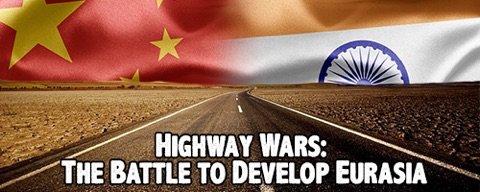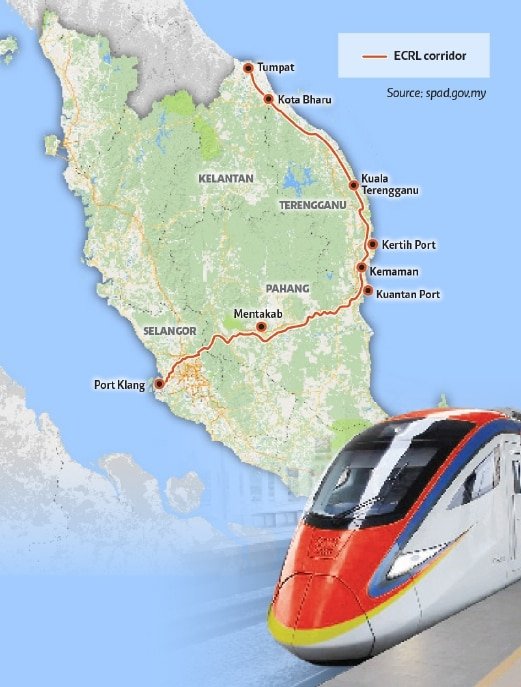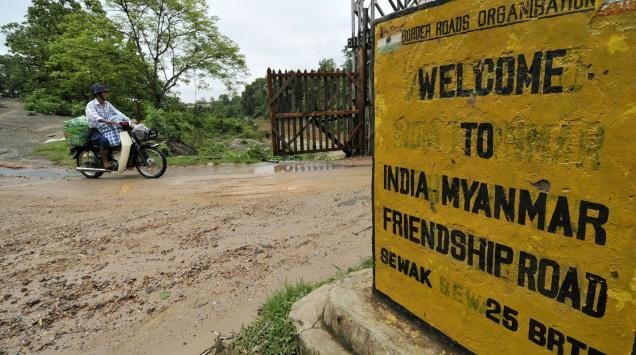Highway Wars: The Future of Warfare?
by James Corbett
corbettreport.com
August 19, 2017
If we can only envision guns and bombs when we think about war, then it indicates merely a failure of our own imagination. Make no mistake: There are wars for geopolitical dominance taking place between various players around the globe right now, and it's all happening without a shot being fired or a soldier on the battlefield.
For an example of this we need look no further than Asia, where there is a strange game of one-upsmanship taking place between bitter frenemies China and India, clear rivals for regional economic dominance who happen to also be buddy-buddy in the BRICS and the Shanghai Cooperation Organization and other multi-lateral bodies.
No, I'm not talking about the dramatic border skirmishes currently taking place between Indian and Chinese troops. That's the old, guns-and-bombs type of conflict that gets all the press. I'm talking about something much more subtle, much less headline-grabbing and, potentially, much more important for the future of the region, and, ultimately, the world.
Exhibit A: "Chinese-built mega railway begins construction in Malaysia"
Exhibit B: "India Builds Highway to Thailand to Counter China's Silk Road"
Taken at face value, these are hardly the "stop the presses" headlines that set the public's imagination on fire. But let's look a little closer.
Regarding the Malaysian railway story, this is no ordinary train track. Dubbed the "East Coast Rail Link" (ECRL), the project will span 688 kilometers and act as the first railway artery connecting the country's east and west coasts. It will cut the travel time from the suburbs of Kuala Lumpur to the northeastern state of Kelantan almost in half. Chinese state firms will be both building the railway and footing the bill (a cool $13 billion).
So why is China constructing a railway in Malaysia, anyway? What's in it for the Chinese? Well, as China Daily explains, quoting Chinese State Councillor Wang Yong who attended the project's official launch: "China is willing to work closely with the Malaysian side and build the rail link into another landmark project so as to benefit the Malaysian people as soon as possible and help realize regional development and prosperity." Wishy-washy feel-good political propaganda? Undoubtedly. But nonetheless true, as far as such official statements go.
You see, the ECRL is being touted as a "flagship project" of China's much-ballyhooed Belt and Road Initiative (BRI). As we've discussed before in these pages, the BRI is China's ambitious trillion dollar quest to regain its status as the "middle kingdom" by reviving and updating the ancient Silk Road trading route for the 21st century. Involving a “Silk Road Economic Belt” and a “Maritime Silk Road,” the initiative is starting to throw significant money into development projects throughout China's entire sphere of influence, including Southeast Asia and Eurasia. And as we've also discussed before, the BRI is becoming an increasingly important flashpoint for a new form of globalization ("Globalization 2.0" in the Chinese Communist Party's own formulation) that will be driven and led by China itself.
This may be great for Malaysia and the other beneficiaries of China's largess, but it's obviously a worrying development for China's various regional rivals, most notably India. First, India refused an offer to attend China's first-ever "Belt and Road Forum" in Beijing this year, citing concerns over the $62 billion China-Pakistan Economic Corridor that is part of the BRI and that will include disputed territory in the highly contentious Kashmir region. And now, India is fighting back against China's BRI by...building a highway to Thailand? Welcome to 21st century warfare.
Yes, the highway project, part of a broader $4.7 billion border road development initiative that India launched two years ago, is, like China's Malaysian railway project, ambitious. The plan is to connect Manipur in Northeast India with Mae-Sot in western Thailand via Tamu in Myanmar. The "upgrade and widening" work on the highway link will come at a price of $256 million and will be financed with loan assistance from the Asia Development Bank, the (faux) "rival" to China's Asia Infrastructure Investment Bank.
As Rajiv Biswas, Singapore-based chief economist at IHS Markit, tells Bloomberg: "If India wants to be part of growth dynamic of Asia it needs to develop infrastructure links and that is why this project is a very important first step."
The idea of development and infrastructure projects as an integral part of diplomacy and even regional dominance is hardly a new one, but China's moves in this direction are nonetheless highly significant and are causing India and other regional players to take notice. As Moammar Gaddafi pointed out to a gathering of students at Oxford shortly before he was murdered by NATO-backed goons, the world is now facing a choice between two models of diplomatic dominance and political influence: the American model--which he described as "a harsh, rough approach" involving "soldiers, weapons and military bases"--and the Chinese approach.
"China does not lecture African countries about their system of government, human rights, freedom of expression, good governance or such like," Gaddafi explained. "China never interferes in the internal affairs of other states. It does not bring in soldiers, military bases or military command. More than 600 Chinese corporations are penetrating deep into Africa. Some Chinese communities have started to settle in Africa. This is China's soft approach.
"Because of that soft approach, Africans are welcoming China warmly. This will no doubt be to China's benefit. Africans are wary of the US because of its harsh approach. This is proof of the folly of American policy."
Now, my regular audience will knows my position: that this is a rigged game with loaded dice. The international "superclass" that pays no allegiance to any particular country is preparing to abandon the American Empire as the engine of global dominance for a multilateral BRICS-fronted IMF-administered globalist slave state. But nevertheless, there's something to be said about an era in which the top geopolitical disputes involve competing development and infrastructure projects rather than threats of all-out thermonuclear war, isn't there? Let's hope this is a trend that persists.



Thanks for the information .. i am happy to see this news .. help devoted me
Very interesting ..thanks for doing real journalism
https://steemit.com/introduceyourself/@kamilah/buenas-noches-amigosss
Your articles are always very informative and well researched. Thank you very much for your hard work!
I hope those Railways can be used for the common people aswell.
If it's not about profit then those project would not be realized and that is sad. We need to invest more into humanity rather than into corporate investments.
Thank you so much for everything you do and I hope I can support you even more with this beautiful steemit project.
Kind regards
Eric
In the perspective of a Malaysian, this does help elevate the life of the rural states (east coast) which the government had long been propagandizing about it. Until now, with the financial support from China, the project finally can carry out.
Also worth noticing that Chinese (mostly Han) make up to 23% of the total Malaysian population (~7.5M), 14% in Thailand (~9.5M) and 76% in Singapore (~3M). Wikipedia
Whatever is following these Chinese roads building is surely going to be managed by people of Chinese ancestry.
Not sure how India is going to counter that.
Modern warfare do not use guns, tanks, and fighter plane. But they are now using money might. Economic warfare and cyber warfare is a new trend of today's world war. If you're not aware, world war III between Mother Russia, China and USA has already begun, not buy guns but on economic level.
Russia cannot compete economically on an international level. It is too centralised and taxes are too high. It's population is also shrinking. However militarily they are strong. America is declining and China and Russia (in that order) will replace America as the super powers. China is strong economically but weak politically and if Russia can exploit that than they can become the leading superpower if their population stabilizes. All they would have to worry about is Japan and maybe a possible united Korea
very intersting and lot knowleged about china and India thank you
Have always liked your work man keep it up ! Glad your on Steem !
https://steemit.com/introduceyourself/@kamilah/buenas-noches-amigosss
Great work from you as usual James @corbettreport , but my question is, how many people in the Malaysian indigenous territories will be disrupted?

Wonderful...! Upvoted & Resteemed ,
https://steemit.com/introduceyourself/@kamilah/buenas-noches-amigosss